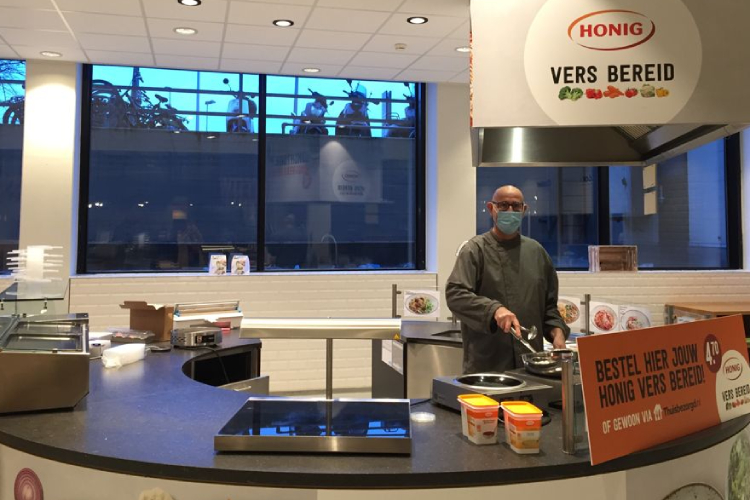A pizza with toppings for 8,50 euros. A baguette for almost 5 euros. A bag of vegan sweets for 9 euros. These prices are very familiar to students of VU Amsterdam who eat at the university’s main canteen, the Food Plaza. A complete, warm meal with a drink is hard to find for less than 10 euros. It is therefore no surprise that many frustrated students choose to buy their lunch at the döner kebab stand across the street instead.
But how is it possible that a university canteen cannot offer affordable food to its students, many of whom are struggling financially?
Before VU Amsterdam began hiring commercial catering services, the university took care of the food catering themselves and they offered warm meals for a couple of euros, as some alumni recall. The switch happened 13 years ago, when VU chose to outsource their catering and banqueting services, offering four to eight-year contracts, as Irene Bos, VU’s catering manager, explains. The university’s current catering company is Eurest and it is in charge of all the restaurants and bars on campus, with the exception of The Basket and Doppio, none of which offer cheaper prices than the Food Plaza. Because the catering services pay a part of the turnover to the university, this system saves VU Amsterdam a large amount of money.
Unproportionate prices
Interestingly enough, the issue is not confined to VU Amsterdam. Students from the Universiteit van Amsterdam, Universiteit Utrecht, and Universiteit Groningen have complained about the unproportionate prices of their university’s canteen based on the quality and the quantity of the meals. All these Dutch universities operate with the same system as VU Amsterdam, recruiting commercial catering companies to manage their canteens. There seems to be a common objective to depart from the classic ‘school cafeteria’ and offer more modern and international food courts to attract the students.
‘Even in Switzerland, which is one of the most expensive countries in the world, students can buy cheap meals.’
However, by doing so, the universities neglect the needs and the budget of the average student, as Julius, a Swiss first-year student states: “The VU Food Court resembles those hip, expensive restaurants which offer all the latest food trends, but that is not what students need at a university canteen. We want simple, warm meals for student prices.” He is surprised by the high prices he has to spend for a meal at the university: “Even in Switzerland, which is one of the most expensive countries in the world, students can buy cheap meals at their universities. What I would spend on a meal in Switzerland is barely enough for a cold drink at the VU Food Plaza.”
Different story
International students are particularly disappointed with the food situation in Dutch universities since it is a completely different story in the rest of Europe.
The University of Milan, for example, handles the catering of their canteens themselves. At this university, like in many other Italian universities, enrolled students are offered warm meals, including a drink and a dessert, for 3,30 euros every day.
‘Many international students avoid VU Amsterdam’s restaurants entirely’
In Germany, canteens are catered by student unions, whose purpose is to take care of student well-being. Whereas the universities are responsible for research and education, cheap food and housing are ensured by the unions. At the University of Munich, a student meal provided by the ‘Studentenwerk München’ only costs 2,40 euros. At VU Amsterdam, this would not be enough to buy a yogurt.
Even universities that use commercialized catering for their canteens manage to provide low-cost meals for their students. In Belgium, the KU Leuven’s Alma Catering offers meals for 4 euros. At the University of Innsbruck, Austria, which is the same size as VU Amsterdam, complete meals are offered by ‘mein Catering’ for 2-5 euros. Meals consisting of pasta, rice, meat, or fish are the most common, but different dietary and vegetarian options are presented by all these universities as well. For international students used to these prices, spending three times as much at their Dutch university can be hard to get used to – many avoid it entirely.
Home-made lunch
Several Dutch students feel the same way: “I would love to have cheap canteens on campus”, says Sophie, a first-year Dutch VU student. She explains that packing a lunch from home and taking it to university is a very typical thing to do for Dutch students. For many of them, going to the university canteen is not an option: “If university canteens were cheaper here, more Dutch students would eat there instead of having to take their own lunch with them. I think this habit is partly a result of the overpriced canteens.”
‘Packing a lunch from home is a very typical thing to do for Dutch students’
There is another difference that makes Dutch universities stand out: while all the canteen menus and costs are available on other European universities’ websites, the official prices for VU Amsterdam, the Universiteit van Amsterdam, Universiteit Utrecht, and Universiteit Groningen are nowhere to be found. Numerous emails to these universities asking for a price list were ignored. Furthermore, VU Amsterdam and their catering company were contacted and asked for a menu numerous times – they refused to share their prices with the author of this article. When asked, the university stated that they did not think the canteen was expensive.
Multiple problems
Because in the Netherlands the amount of funding a university receives is calculated based on how many students study there, more and more English-speaking programs are being used to attract students from all over the world every year. While the Netherlands strive for academic excellence, the rapidly growing student population leads to multiple problems, such as housing, transportation and food. The demand for an inexpensive canteen is therefore just one of many demands students have voiced towards the VU administration.
